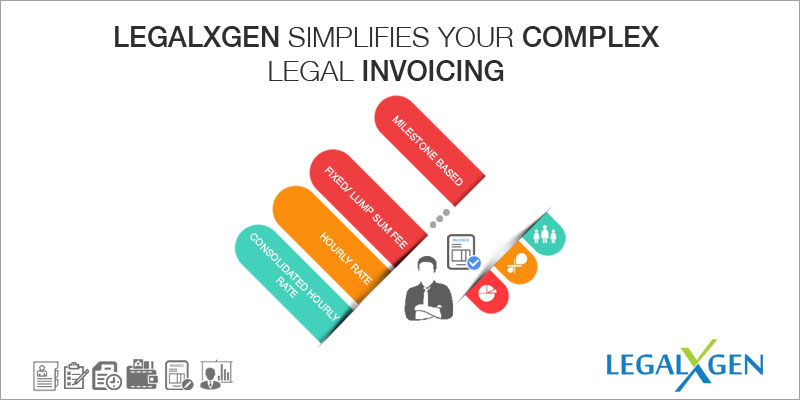Lawyers are known to invoice their clients differently depending on the nature of work, practice areas and segments. It often gets confusing for not only the clients but also the lawyers themselves to arrive at a definite structure and invoice amount for a particular case.
Here is an attempt to explain various law firms billing structure.

Fixed/ lump sum fee- A fixed or flat fee is simply a prearranged total fee that is paid upfront to complete all work required for a particular legal matter.
Hearing Based Fees- The customers in this model are charged on the number of hearing that the lawyer represent them in the court.
Hourly Rate- The lawyer will charge you for each hour (or a portion of an hour) that the lawyer works on your case. Invoice Amount = Hourly rate * no. of hours
Milestone Based Fees- In this structure, all the stages of a case are defined and the proportionate amount is fixed for every stage.
Consolidated Hourly Rate- Consolidated hourly rate is a uniform hourly rate for the entire number of hours that the case is worked, irrespective of different associates working on it.
Retainer-ship Fees- The clients are charged a fixed amount on a periodical basis for all the works. Invoices are sent regularly on a periodical basis.
Mixed Fees- It is an advanced version of retainer model. Here the lawyers cap certain hours and charge additional then the capped hours are surpassed.
Per Acre Fees- This fee is relevant to lawyers working for real estate clients. The fee here is a fixed amount charged on per acre area of land being the subject of the matter.
Task Hourly Rate- In this arrangement, every task is charged at a specific rate and the net amount is cumulative sum of all the hours worked for different tasks.
Pro Bono- Pro Bono means professional work undertaken voluntarily and without payment. Though the client is not charged any amount, it is essential for the lawyers to record the value of the charity work.
LegalXGen supports all the above-mentioned billing types and much more, easing law firm invoicing and hassle free finance management. It also helps in tracking down the payments, overdue and in client follow up.

Has 18+ years of experience in UI/UX Architecture of Enterprise Applications along with a specialization in Social Media, Digital Marketing and SEO
 English
English French
French German
German

